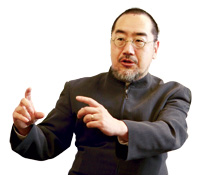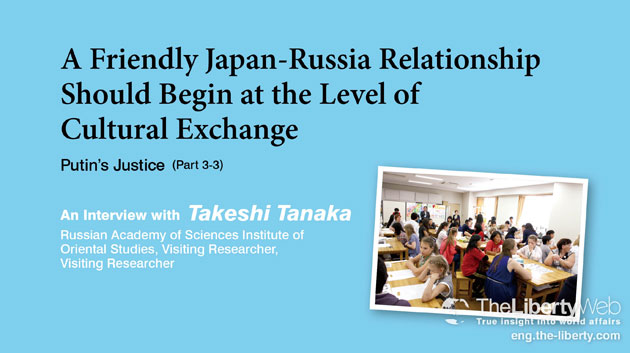A Friendly Japan – Russia Relations Should Begin at the Level of Cultural Exchange (Part 3-3)
An Interview with Takeshi Tanaka

Takeyuki Tanaka
Visiting Researcher at the Russia Science Academy’s Eastern Research Center
Takeyuki Tanaka was born in Fukuoka in 1963 as the great grandson of the founding president of the Genyosha, Kotaro Genyosha, who helped Sun Yat-sen’s exile to Japan. He became a fellow at the Gifu Women’s University Center for South Asian Studies as well as an All Japan Russian Studies Research fellow. His works have included “Actually, Russians Love Japanese” (Takarajimasha Inc.) and “People Enshrined in Yasukuni” (Gakken Publishing Co., Ltd.).
I’ve dealt with many Russians, and I’ve found them to be extremely loyal and kind to people. They were not dry. They valued relationships with others.
Russia has always been a multi-ethnic country, and there are many people that even look similar to Japanese men and women. They are patriotic, but one does not get a sense of ethnic or white supremacy.
There are cultural similarities between Japan and Russia as well. Russian music, for instance, slightly differs from Western music, and it has a bit of Asian influence. A song, that is popular at the moment, reminds me of “Yuming”. There are even Russians who have come to Japan because of enka; perhaps our musical tastes are very similar.
There are Russians who say that they feel some affinity for Japanese Shinto-ism. Russia was originally a polytheistic country, and while most Russians of today are Russian Orthodox Christians, they also have roots in ancient nature worship. Three of Russia’s Republics are Buddhist, and people can sense a certain proximity to Asia.
It’s worthy to point out that perhaps due to a reaction from the banning of religion during the Soviet era, the Russia of today is seeing a resurgence and boom in religious worship.
Russians Admire the Samurai Spirit
Russians greatly admire Bushido or samurai spirit. President Putin understands the spirit of Japanese martial arts as a Judo practitioner.
Colonel Takeo Hirose, who died in the Russo-Japanese War, lived in Russia for five years and even mingled with its aristocracy. He was admired for his samurai spirit, and many Russians liked him. The Russian troops, who discovered Takeo Hirose’s body during combat, wept and solemnly held funeral services.
The Japanese and Russians should foster deeper understandings of their spiritual connections.
The Liberty staff also thinks it’s important to improve cultural exchanges, to learn Russia’s languages and cultures, to provide Russians with technical guidance, and to exchange more students on both sides with the hopes of deepening their understandings of each other, and so on.
Otherwise, even if Japan solves the political problems, and Russia returns the northern territories, there will not be a true friendship.
It is not reported much in Japan, but the current crisis in the Ukraine is not only resulting in clashes between troops and security forces, but it’s also causing many civilian deaths. It’s a disastrous situation.
Japan is acquiescing to the Western position, but it should be more frank in stating its opinion to mediate between the United States, Europe, and Russia. In the future, it will become increasingly important for Japan to review its post-WW2 status and to be able to hold its own in diplomatic circles.



















